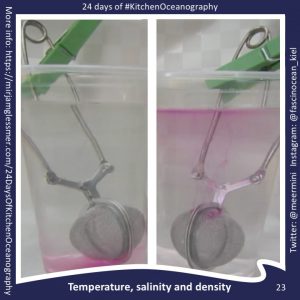
Search: melting ice cubes

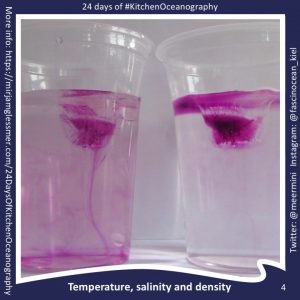
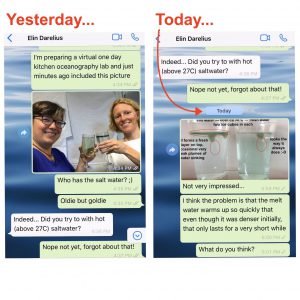
On melting ice cubes and molecular diffusion of heat
First of all, let me say how much I love having chats like the one Elin and I had over the weekend (which you only see the very beginning of…
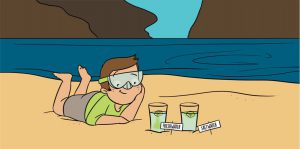
Melting ice cubes experiment published in kids’ journal Frontiers Young Minds
On publishing in a journal peer-reviewed by kids, and suggesting it as a first journal new PhD students should be asked to write for You guys might remember my favourite…
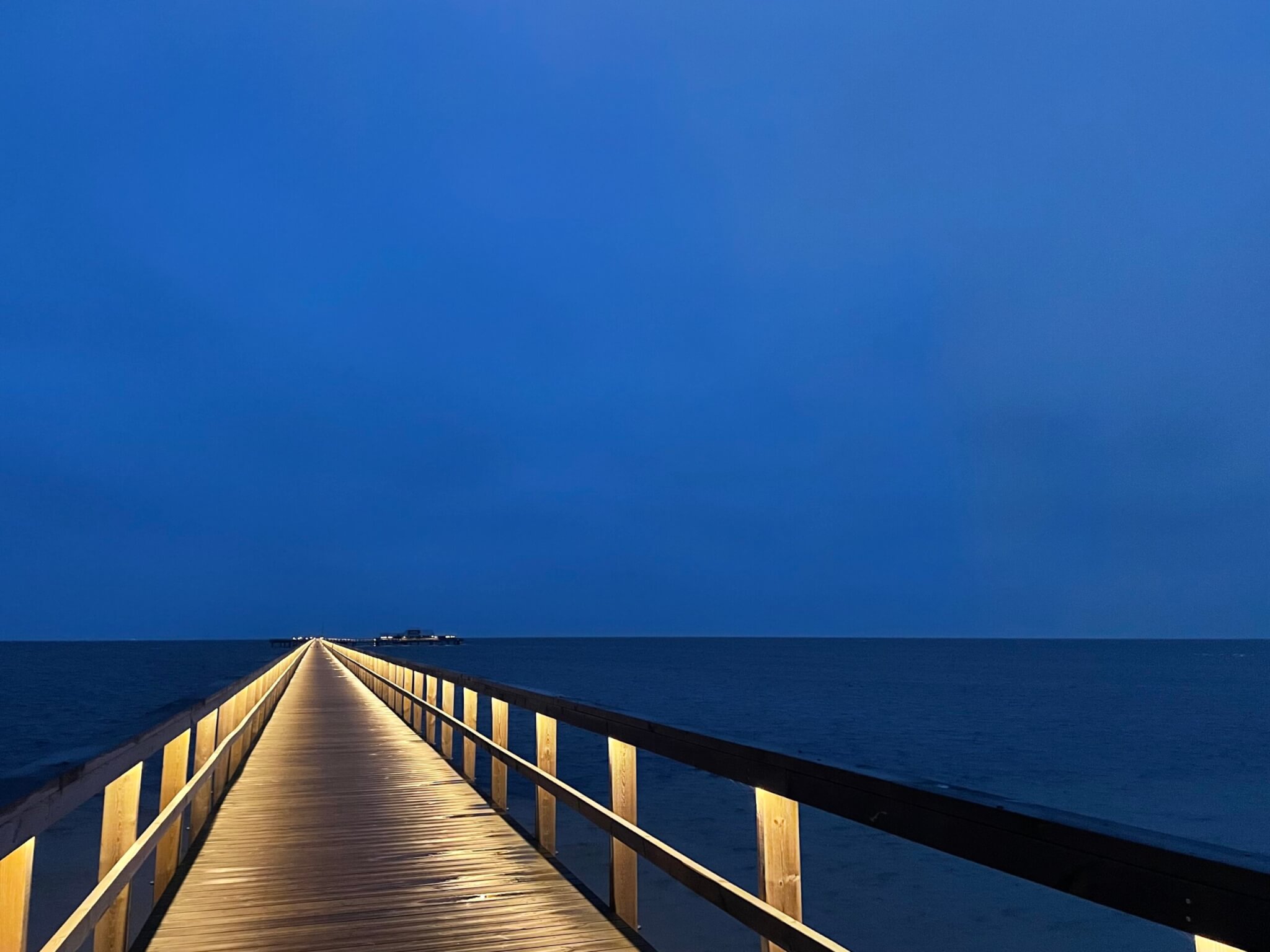
Observing the “melting ice cubes” experiment with a thermal imaging camera
Remember the melting ice cube experiment? Great! If I had the chance to teach an intro to oceanography or some other class where I have time with students over a…

Melting ice cubes experiment — observing the finer details
If you don’t know my favourite experiment for practically all purposes yet (Introduction to experimenting? Check! Thermohaline circulation? Check! Lab safety? Check! Scientific process? Check! And the list goes on…

Melting ice cubes & thermal imaging camera
I haven’t talked about my favourite experiment in a long time (before using it last week in the MeerKlima congress and suddenly talking about it all the time again), because I…

Melting ice cubes, again
Somehow I am stuck on this demonstration! I can’t let go of this experiment. Last time I posted about it, someone (Hallo Papa!) complained about the background and how I…

Melting ice cubes reloaded
Or why you should pay attention to the kind of salt you use for your experiments. The melting ice cubes in salt and fresh water is one of my favorites that…

Melting ice cubes – what contexts to use this experiment in (post 4/4)
What contexts can the “ice cubes melting in fresh water and in salt water” experiment be used in? As you might have noticed, I really like the “ice cubes melting…

Melting ice cubes – one experiment, many ways (post 3/4)
Different didactical settings in which the “ice cubes melting in fresh and salt water” experiment can be used. In part 1 and 2 of this series, I showed two different…
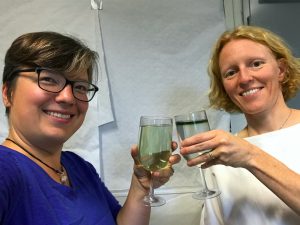
Ice cubes melting in fresh water and salt water
Today we are doing the melting ice cubes experiment in fancy glasses, because Elin is giving a fancy lecture tonight: The Nansen Memorial Lecture of the Norwegian Science Academy in…

Experiment: Ice cubes melting in fresh water and salt water
Explore how melting of ice cubes floating in water is influenced by the salinity of the water. Important oceanographic concepts like density and density driven currents are visualized and can…
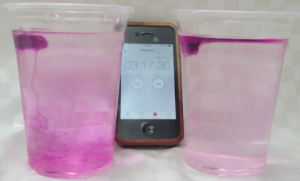
Considered exemplary: My “ice cubes melting in fresh water and salt water” in the “on the cutting edge” teaching collection! :-)
After reading recently that I am being considered the queen of the melting ice cube (aaaaw, thank you!!!), having my movies of the experiment featured in Elin Darelius and Petra Langebroek’s article…
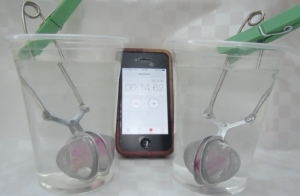
Ice cubes melting at the bottom of the beakers
Because surely there is one more post in this topic? ;-) For those of you who haven’t heard about the “melting ice cube” obsession of mine, please check out the…

Dangers of blogging, or ice cubes melting in fresh water and salt water
When students have read blog posts of mine before doing experiments in class, it takes away a lot of the exploration. Since I was planning to blog about the CMM31…

Ice cubes melting in fresh water and salt water (post 2/4)
The “ice cubes melting in fresh water and salt water” experiment the way I usually use it in class. — Edit — For an updated description of this experiment please…

Ice cubes melting in salt water and freshwater (post 1/4)
Experiment to visualize the effects of density differences on ocean circulation. This is the first post in a series on one of my favorite in-class experiments; I have so much…

Did you know that uranine starts fluorescing again when the ice cubes melt?
Yes, I had to test that! :-D Why do I find this exciting? Because that means that a phase change of the water switches fluorescence as a tracer of that…

Sea ice formation, brine release, or: What ice cubes can tell you about your freezer
Many of my kitchen oceanography experiments use dyed ice cubes, usually because it makes it easier to track the melt water (for example when looking at how quickly ice cubes…
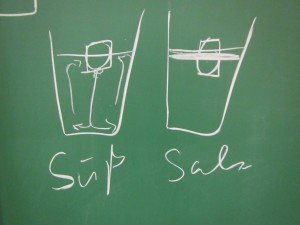
Using the “melting ice cube” experiment to let future instructors experience inquiry-based learning.
Using the “melting ice cube” experiment to let future instructors experience inquiry-based learning. I recently (well, last year, but you know…) got the chance to fill in for a colleague…

Taxonomy of multiple choice questions
Examples of different kinds of multiple choice questions that you could use. Multiple choice questions are a tool that is used a lot with clickers or even on exams, but they…

On how ice freezes from salt water
I’ve been wondering how to best show how sea ice freezes for quite a while. Not just that it freezes, but how brine is rejected. By comparing the structure of…
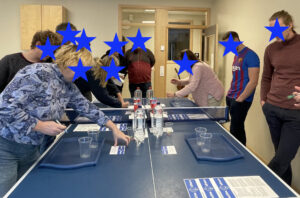
A #KitchenOceanography escape game for freedivers!
For the Christmas party of my freediving club, Active Divers, I made a freediving-themed #KitchenOceanography “escape game” (of sorts). If you are interested to use it for your own purposes,…
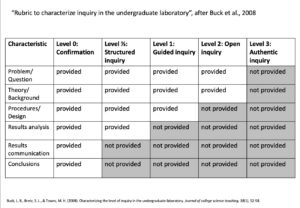
Increasing inquiry in lab courses (inspired by @ks_dnnt and Buck et al., 2008)
My new Twitter friend Kirsty, my old GFI-friend Kjersti and I have been discussing teaching in laboratories. Kirsty recommended an article (well, she did recommend many, but one that I’ve…
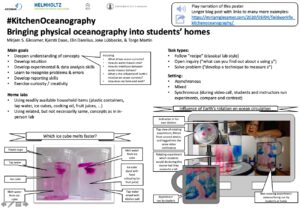
#KitchenOceanography as #FieldWorkFix
This is the longer version of the (A4!) poster that I am presenting on behalf of myself, Kjersti Daae, Elin Darelius, Joke Lübbecke and Torge Martin at the #FieldWorkFix conference next…
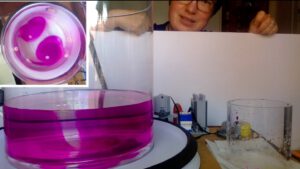
Tilting frontal surface under rotation / cylinder collapse
Torge and I are planning to run the “tilting of a frontal surface under rotation / cylinder collapse” experiment as “remote kitchen oceanography” in his class on Thursday, so I’ve…

Workshop prep and a riddle
Looking at the picture below, can you guess which experiment I am going to do at the MeerKlima.de workshop? Yep, my favourite experiment — melting ice cubes! :-) And I am…
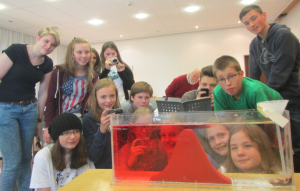
How to plan a course from scratch
Where do I even start??? A very helpful concept, which is completely contrary to how most people approach course planning, is “backward design”. Instead of looking at all the cool…

Why folic acid might be good for people, but not so good for tank experiments
I had to do the complete series of experiments, of course… The other day I mentioned that I had used salt from my kitchen for the “ice cubes melting in…

The icy elevator
Weird things happening when ice cubes melt. Remember I said that there were weird and wonderful things going on when I last ran the melting ice cubes in salt and…
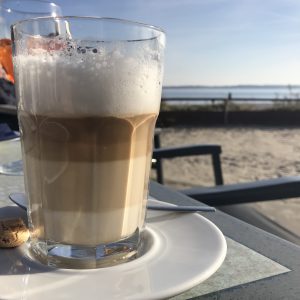
#KitchenOceanography
/ˈkɪtʃɪn ˌəʊʃəˈnɒɡrəfi/ noun Experimenting with ocean physics using only household items Observing oceanographic processes in, or during the preparation of, food and drinks DIYnamics: Rotating tank experiments based on LEGO…
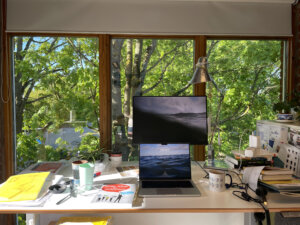
Currently reading “Social media for academics” by Carrigan (2020)
I’ve been teaching about social media for academics in one way or another for a long time. I have recommended at least two books to read (links to my blogposts…
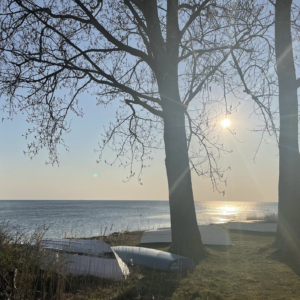
#WaveWatchingWednesday
Wow, I am so bad at posting wave watching pics recently… Here is everything that happened on my wave watching Instagram @fascinocean_kiel in the last 10 weeks! Enjoy!
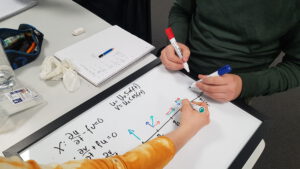
Small groups work on shared artefacts
Participation in shared production of artefacts is a great way to learn in a community, because putting things on paper (or, as we will see later, on online slides or…

About #KitchenOceanography
At the end of last year, I did a poll on Twitter, asking what people would like to see more of in 2021: Kitchen oceanography, wave watching, teaching & scicomm…

#WaveWatchingWednesday
Last #WaveWatchingWednesday of 2020 — this year’s final compilation of my Instagtam posts! Today with a lot of non-wave watching pics. But who doesn’t love some #KitchenOceanography?
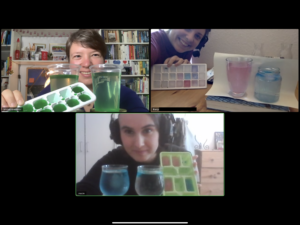
Treibholz podcast, my third episode in 2020
Another episode of the Treibholz podcast (in german) with Ronja, Maxie and myself! We are doing Elin’s favourite experiment (ok, mine too), looking at ice cubes melting in fresh water…
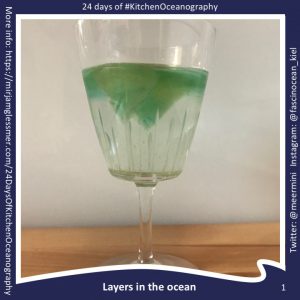
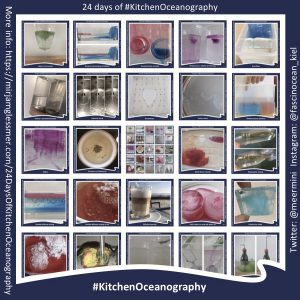
“Excursion week” in Oceanography 101 while physically distancing
My friend’s university recently decided that “excursion week” (a week in May during which there are no lectures or exercises or anything happening at university to make time for field…
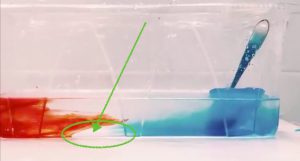
Brine rejection and overturning, but not the way you think! Guest post by Robert Dellinger
It’s #KitchenOceanography season! For example in Prof. Tessa M Hill‘s class at UC Davis. Last week, her student Robert Dellinger posted a video of an overturning circulation on Twitter that got me…
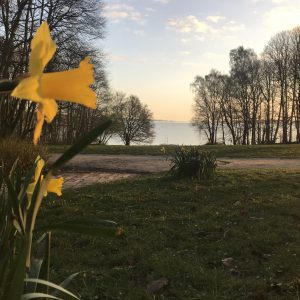
#WaveWatchingWednesday
Welcome to another #WaveWatchingWednesday post, where you get all of last week’s wave watching pics from my Instagram @fascinocean_kiel in one go! Let’s get started: Fascinating how different parts of…

Herzlich Willkommen zur Küchenozeanographie!
Herzlich Willkommen zur Küchenozeanographie! Hier findest Du Videos und Anleitungen für zwei Experimente, die ich im Rahmen der virtuellen Gauß-AG der Leibniz Universität Hannover vorbereitet habe. Ich hoffe, Du hast…
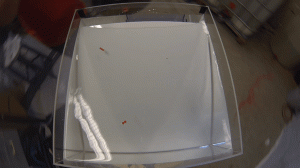
Planetary Rossby waves
I ran my new favourite experiment again, the planetary Rossby waves. They work super well on the DIYnamics table we built in Kiel and they also worked really well the other…
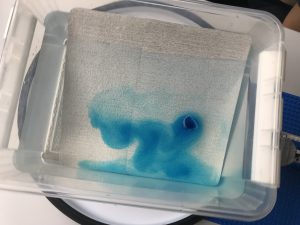
Planetary Rossby waves on Beta-plane. A super easy tank experiment!
This is seriously one of the easiest tank experiments I have ever run! And I have been completely overthinking it for the last couple of weeks. Quick reminder: This is…

New role: Associate Editor at Frontiers for Young Minds!
When I meet new people and am asked the compulsory “and what do you do?” question, I sometimes struggle to answer. I am wearing so many different hats! Depending on…

What’s #kitchenoceanography all about?
Preparing my talk at the Science in Public conference in Manchester… A definition of kitchen oceanography /ˈkɪtʃɪn ˌəʊʃəˈnɒɡrəfi/ noun Kitchen oceanography is where my blog “Adventures in oceanography and teaching” —…

Experiment: Oceanic overturning circulation (the easiest version)
“The easiest” in the title of this page is to show the contrast to a “slightly more complicated” version here. Background One of the first concepts people hear about in the context…

Teacher training at Lotseninsel
As I mentioned yesterday, I recently contributed to a teacher training on Lotseninsel, a tiny island on the Baltic Sea coast. The training was run by the Ozean:Labor of the…

My workshop at MeerKlima.de
Today I ran a workshop at the MeerKlima.de congress in Hamburg: A congress for high school students, organised by a student committee. The large lecture theatre of the chemistry department at…

Temperature-driven overturning experiment – the easy way
In my last post, I showed you the legendary overturning experiment. And guess what occurred to me? That there is an even easier way to show the same thing. No gel…

Tales of a science camp: 1. Forscherfreizeit Ratzeburg
Conny, Siska, Martin and myself just — we came back home only yesterday! — ran a summer camp for teenagers called “Forscherfreizeit Ratzeburg”. The idea was to combine a fun…

Oceanography PBL workshop and case
My awesome colleague Marisa ran another workshop on Problem-Based Learning (PBL) in which I was lucky enough to assist. For the last workshop for people who are planning to use PBL in their…

Guest post: The mystery of the cold room
Guest post by Kristin Richter! Today I’m excited to bring to you a guest post from Innsbruck, Austria, written by my friend Kristin Richter. Kristin ran the oceanography lab in Bergen…